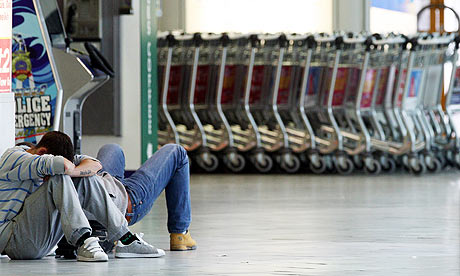
Passengers wait at Newcastle International
airport after flights were cancelled yesterday due to the volcanic ash
cloud. Photograph: Scott Heppell/AP
To add to the misery for passengers, British Airways cabin crew are poised to start a series of strikes tomorrow.
A no-fly order imposed by the Civil Aviation Authority closed Heathrow and Gatwick until 7am and both would only partially reopen over the next six hours, the air traffic authority, Nats, said.
Flights were also grounded until lunchtime across Northern Ireland and much of Scotland and Wales, with warnings of widespread knock-on disruption later in the day here and abroad.
There would be no arrivals at Gatwick until 1pm at the earliest, while Heathrow would see reduced take-offs and departures as well as extended delays and cancellations.
Large regional airports, such as Manchester, Glasgow and Stansted, were open, but passengers were being urged to check with their airlines before leaving for the airport.
Nats said the ash cloud was "continuing to change shape" as it spread from southern England to Northern Ireland, and over much of Scotland to the Shetland Islands.
The latest disruption comes a month after the Eyjafjallajokull volcano eruption cancelled flights across Europe, and as talks continued to try to avert a strike by BA cabin crew. Up to 11,000 BA flight attendants are due to start the first of four five-day strikes tomorrow. Attempts to halt the walkout were due to take place today: BA was to seek a high court injunction this morning followed by face-to-face talks with the Unite trade union, and discussions with the transport secretary, Philip Hammond.
"Our primary objective is to minimise disruption for passengers," Hammond told BBC News, adding, however, that he did not want to hold out hope for a "miraculous breakthrough".
Efforts to halt industrial action came amid warnings that the ash restrictions could persist in the UK until tomorrow.
Forecasters were expecting the north-westerly wind to change direction today and blow the "high density" cloud away from Britain tomorrow. Earlier revisions to the no-fly zone meant airports in the north of England reopened from 1am , after being closed for most of yesterday.
But Manchester airport warned: "It is absolutely essential that people contact their airline before travelling to the airport for any flight because there are still high levels of ash contamination above parts of Britain which may bring further disruption."
Luton and East Midlands airports were operational, while in Scotland, Prestwick airport was no longer in the no-fly zone but a spokeswoman said it would not be receiving any flights until 12.45pm. Aberdeen airport would be shut until at least 1pm.
Flights in and out of Dublin were grounded until at least midday.
EasyJet said it was cancelling all flights to and from Edinburgh and Belfast until at least midday.
BA told passengers that if their flights were cancelled they could rebook on the next available flight or claim a full refund.
"We, like all airlines flying from London airports, are likely to experience significant disruption to our operations (this) morning," the airline said. "You are strongly advised to check the status of your flight before heading to the airport. We apologise for the inconvenience caused, but the situation is beyond our control."
The Virgin Atlantic president, Sir Richard Branson yesterday described the closure of Manchester airspace as "beyond a joke".
"All the test flights by airlines, aircraft and engine manufacturers have shown no evidence that airlines could not continue to fly completely safety," Branson said.
A spokesman for BA said airlines should take the decision whether or not it was safe to fly, describing the current approach as "overly restrictive" and "not justified".